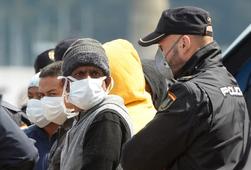 Crew members of the vessel "MV Karar" are arrested by Spanish police officers in the port of Vigo, on April 28, 2020 after the vessel was seized carrying 4000 kgs of cocaine, amid a national lockdown to fight the spread of the COVID-19 coronavirus. (MIGUEL RIOPA / AFP)
Crew members of the vessel "MV Karar" are arrested by Spanish police officers in the port of Vigo, on April 28, 2020 after the vessel was seized carrying 4000 kgs of cocaine, amid a national lockdown to fight the spread of the COVID-19 coronavirus. (MIGUEL RIOPA / AFP)
VIENNA - Coronavirus-related border controls, lockdowns and flight shortages are making illegal drugs more expensive and difficult to obtain around the world, the United Nations Office on Drugs and Crime (UNODC) said in a report published on Thursday.
“Many countries across all regions have reported an overall shortage of numerous types of drugs at the retail level, as well as increases in prices, reductions in purity and that drug users have consequently been switching substance (for example, from heroin to synthetic opioids) and/or increasingly accessing drug treatment,” the report said
The pandemic is having a mixed effect on drug production in different regions and on smuggling by air, land and sea, but the overall trend in countries where drugs are consumed appears to be relatively uniform, the UNODC said in the report on COVID-19, the illness caused by the coronavirus.
“Many countries across all regions have reported an overall shortage of numerous types of drugs at the retail level, as well as increases in prices, reductions in purity and that drug users have consequently been switching substance (for example, from heroin to synthetic opioids) and/or increasingly accessing drug treatment,” the report said.
ALSO READ: Peruvian coca farmers to Paris pushers, virus upends narcotics trade
While opioids like heroin are almost entirely transported by land, where increased checks may be disrupting deliveries, cocaine is mainly shipped by sea. A recent rise in heroin seizures in the Indian Ocean might indicate an increase in heroin shipments to Europe by sea, the UNODC said.
The current lack of flights will probably have a “particularly drastic” effect on smuggling of synthetic drugs including methamphetamine to countries such as South Korea, Japan and Australia, it added.
In Afghanistan, the world’s biggest producer of heroin, the opium harvest between March and June might be disrupted if workers are unable or unwilling to travel, the UNODC said, though it provided little evidence to support that.
ALSO READ: Masked and standing apart, the world tiptoes out of lockdown
“A shortage of poppy lancers has already been observed in the western and southern provinces of the country, mainly due to the closure of a border crossing with Pakistan,” it said.
“However, women in poppy-growing households appear to be increasingly engaged in the poppy lancing process, as do people who lost their jobs due to the COVID-19 crisis.”
In the Andean countries where the coca plants from which cocaine is made grow, the picture was varied.
“Cocaine production appears to be being impeded, as producers, especially in eastern Colombia, are suffering from a shortage of gasoline, which was previously smuggled from the Bolivarian Republic of Venezuela and is essential in cocaine production,” it said, without stating a connection to COVID-19.
READ MORE: US indicts Venezuela's Maduro, aides on narco-terrorism charges
In Bolivia, recent challenges related to the spread of COVID-19, combined with political turbulence in late 2019, appear to be limiting the ability of state authorities to control coca bush cultivation, the UNODC said.


